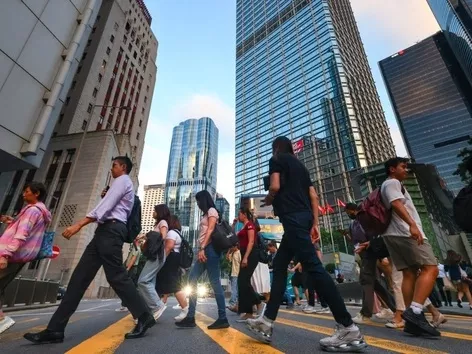Extended Work visas for foreign graduates: in which countries can you get a work permit after graduation and build a career?
Table of contents
- United Kingdom: Graduate Visa
- Germany: Post-study work permit (Aufenthaltserlaubnis zur Arbeitsplatzsuche)
- Canada: Post-Graduation Work Permit (PGWP)
- Australia: Post-Study Work Visa (Subclass 485)
- New Zealand: Post-study work visa
- Ireland: Third Level Graduate Programme
- Netherlands: Orientation Year (Zoekjaar)
- Sweden
- France
- South Korea

Extended work visas open the door to new opportunities for international students, allowing them to not only complete their academic journey, but also begin a new chapter in their lives in the country that has become their home. Find out in which countries you can get a work permit after graduation and build a career
For many international students, studying abroad is not just about getting an education, but also about starting a successful career in a new country. Extended work visas, also known as post-study work visas or post-graduation work permits, allow graduates to stay and work in their country of study after graduating. These visas are designed to help students transition from academic to professional status, allowing them to gain valuable work experience, contribute to the economy, and sometimes even apply for permanent residency.
Here’s a look at some of the most popular countries that offer extended work visas for international graduates, along with their requirements and pathways to long-term career success.
Planning a trip abroad? Choose a reliable health insurance policy on the Visit World portal.
United Kingdom: Graduate Visa
The United Kingdom offers a post-study work visa, known as the Graduate Visa, which allows international students to stay in the country and work or seek employment at any skill level for two years after completing a degree from a recognized institution.
PhD graduates can stay for up to three years.
Key requirements
- The applicant must have successfully completed their coursework and obtained a degree at a UK higher education institution.
- The application must be made during the student’s stay in the country and before the expiry of their student visa.
- The visa allows students to work full-time in any job.
Benefits
- The graduate visa offers flexibility as there are no restrictions on the type of work or employer.
- The visa can be extended if the graduate later qualifies for another visa category, such as a skilled worker visa.
Germany: Post-study work permit (Aufenthaltserlaubnis zur Arbeitsplatzsuche)
Germany is well known for its strong job market, particularly in sectors such as engineering, technology and business. International students who have completed their studies at a German university can apply for an 18-month residence permit to look for work related to their field of study.
Key Requirements
- Applicants must have a degree from a recognized German institution.
- The visa is valid for 18 months, during which time graduates can look for work.
- Once a job is found that matches the graduate’s qualifications, they can switch to a work permit.
Benefits
- Graduates can stay in Germany for up to 18 months without pressure to find work.
- Germany has a high demand for skilled workers, especially in sectors such as IT, engineering and healthcare.
Canada: Post-Graduation Work Permit (PGWP)
The Post-Graduation Work Permit (PGWP) in Canada is one of the most popular options for international students who want to stay in the country after completing their education. This open work permit allows graduates to work anywhere in Canada for up to three years, depending on the length of their program.
Key Requirements
- The applicant must complete a study program at a Designated Learning Institution (DLI) in Canada.
- The application must be submitted within 180 days of receiving the final transcript or degree.
- The length of the work permit depends on the length of the study program (for example, a 1-year program will usually qualify for a 1-year work permit, while a 2-year program may qualify for a 3-year permit).
Benefits
- The PGWP is highly valued as it is an open work permit, allowing graduates to work for any employer in any occupation.
- Work experience gained under the PGWP can also contribute to a transition to permanent residence, for example through Canada’s Express Entry system.
Australia: Post-Study Work Visa (Subclass 485)
The Australian Post-Study Work Visa, commonly known as the Post-Study Work Visa, allows international graduates to temporarily live and work in Australia after completing their course. This visa provides the opportunity to obtain long-term visas and permanent residence.
Key Requirements
- Graduates must have completed at least two years of study in Australia.
- The visa is valid for up to two years for most graduates, although it can be extended for some graduates in the regions (up to four years).
- Applicants must apply within six months of completing their studies.
Benefits
- Australia offers a wide range of opportunities for graduates across sectors, particularly in areas such as healthcare, engineering and IT.
- Graduates can apply for permanent residence through the General Skilled Migration (GSM) program or other routes after gaining work experience.
New Zealand: Post-study work visa
The New Zealand Post-study work visa allows international graduates to work in the country for up to three years, depending on the level of qualification they have obtained. The country has a high demand for skilled workers, particularly in sectors such as construction, technology and healthcare.
Key requirements
- The applicant must have obtained a qualification of at least level 7 under the New Zealand Qualifications Framework.
- Graduates can work in any field and are not restricted to any specific employer or job.
- The visa allows graduates to progress to a work and permanent residence visa if they find skilled work.
Benefits
- New Zealand is known for its high quality of life and attractive working environment.
- Graduates can apply for permanent residence through the skilled migrant category if they meet certain criteria after gaining work experience.
Ireland: Third Level Graduate Programme
The Irish Third Level Graduate Programme allows graduates of Irish higher education institutions to remain in the country for up to two years (or one year for those with a level 7 qualification) to seek employment in their field. Graduates can also apply for a further extension if they find employment.
Key requirements
- The applicant must have completed a recognised course at an Irish higher education institution.
- The graduate can work at any qualification level during the initial visa period.
Benefits
- Ireland is known for its growing technology sector, with many international companies offering jobs in Dublin and other cities.
- Graduates can move into employment and then apply for a work permit or residence permit through the Critical Skills Employment Permit for Ireland.
Netherlands: Orientation Year (Zoekjaar)
The Netherlands offers a "zoekjaar" or orientation year for graduates of Dutch higher education institutions. This visa allows foreign graduates to stay in the country for up to one year to look for a job related to their field of study.
Key requirements
- The applicant must have obtained a degree from a recognized educational institution in the Netherlands.
- The graduate can work in any field during the orientation year.
Benefits
- The Dutch job market is particularly strong in sectors such as technology, engineering and finance.
- Graduates can apply for a work permit or a highly skilled migrant visa if they secure a suitable job during the orientation year.
Sweden
Sweden allows foreign students to stay for up to 12 months after graduation to look for a job. Once a job is found, graduates can switch to a work permit.
France
Graduates from French universities can apply for a “Skills and Talents” residence permit to work in France for up to four years.
South Korea
South Korea offers a post-study work visa for Korean university graduates, allowing them to stay for up to two years to find work.
Extended work visas provide an invaluable opportunity for international students to gain work experience and integrate into the host country’s work environment after completing their studies. Whether it’s the UK, Germany, Canada, Australia, New Zealand, Ireland or the Netherlands, each of these countries offers students individual pathways to a smooth transition from education to career. These work visas not only offer the chance to gain valuable professional experience, but also potentially open the door to permanent residency options, making them attractive to international graduates looking to build a long-term career abroad.
Book a consultation with a lawyer on employment issues to understand the specifics of employment after graduation.
Reminder! To obtain a work visa to the USA, a foreigner must have a job offer, however, there are exceptions when you can get the right to move without first finding an employer. We have already told you which visa categories give an expat the right to enter without an invitation.
Products from Visit World for a comfortable trip:
Travel guide for 200 countries;
Legal advice from a local specialist on visa and migration issues;
Travel insurance around the world (please select the country of interest and citizenship to receive services);
Medical insurance all over the world.
We monitor the accuracy and relevance of our information, so if you notice any errors or inconsistencies, please contact our hotline.
Recommended articles
1 min
Work
South Korea is introducing a new “High-Level Visa” to attract foreign professionals in the fields of technology and science. Find out who can get this visa, what benefits it provides, and what other migration programs the government plans to introduce in 2025
15 mar. 2025
More details2 min
Work
Hong Kong attracts talent from around the world through the Talent Visa program, which allows skilled professionals to work and live in the city, contributing to economic growth and innovation. Find out how to get a Talent Visa to work in Hong Kong in 2025, who can apply, what the requirements are for candidates and how the application process works.
16 mar. 2025
More details2 min
Work
Immigration to Australia 2025: the most popular Australian visas and their conditions
Australia is actively attracting skilled professionals, entrepreneurs and young travelers by offering a wide range of visas. Find out which visas are available in Australia in 2025, who can get them and the allowed period of stay under the permit
17 mar. 2025
More details1 min
Work
Singapore is preparing for significant changes to its work visa and S Pass policies to support workforce stability and address the skills shortage. Find out what changes expats in Singapore can expect in 2025
18 mar. 2025
More detailsAll materials and articles are owned by VisitWorld.Today and are protected by international intellectual property regulations. When using materials, approval from VisitWorld.Today is required.
